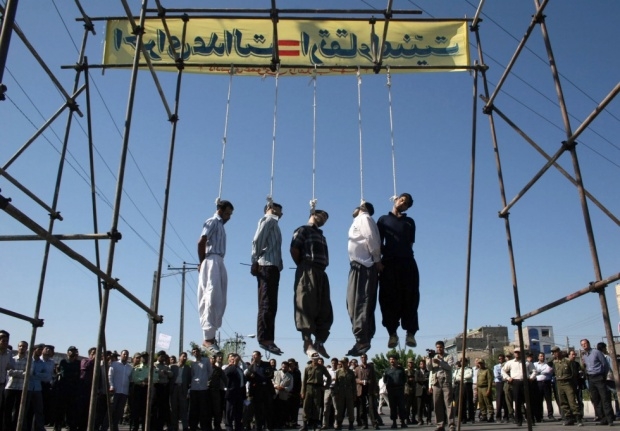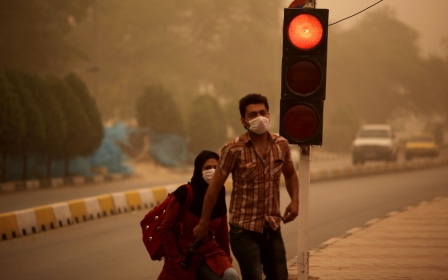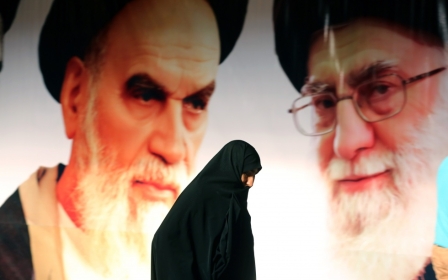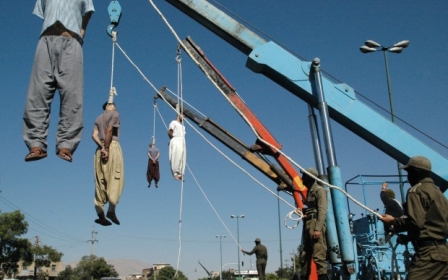Saudi Nimr's execution: Condemnation and hypocrisy

There are several grounds on which to oppose the Saudi execution of Shia cleric Nimr al-Nimr. One can do so due to a principled opposition to capital punishment in general. One can criticise the country's judicial system - Human Rights Watch said this week that it "has documented longstanding due process violations in Saudi Arabia's criminal justice system that make it difficult for a defendant to get a fair trial even in capital cases."
One can criticise Nimr's trial in particular, which Amnesty International called "grossly unfair". One can argue that he should not have been arrested in the first place - HRW cited "vague charges that do not resemble recognisable crimes".
One can oppose his execution because of the repercussions it will have regionally and beyond. One can even do so out of concern for Saudi Arabia itself, not just in terms of domestic unrest among its Shia population, but also its foreign interests.
However, in any situation, condemnation is meaningless when based on hypocrisy. As such, Iran - which has arguably been most vocal about Nimr's execution - does not have a leg to stand on. "It is perhaps surprising that a regime which imprisons journalists, censors cartoonists and holds activists without charge for years on end should be in any position to moralise against another," wrote Evan Bartlett, news editor at The Independent newspaper.
It is galling - almost comical - for the world's second-biggest executioner after China to criticise the third-biggest on the subject of executions. It carries the same moral authority as the US lecturing others about gun control, or Japan discouraging other countries from whale-hunting.
The number of people Saudi Arabia executes annually does not even come close to Iran's tally. The former executed 158 people in 2015, its highest recorded number in a single year since 1995.
Slow death via cranes
However, between January and 1 November last year, Amnesty International recorded 830 executions in Iran, which are carried out by hanging via a crane that is lifted up from the ground, ensuring a slow death. That is equivalent to almost three executions per day, or 984 for the whole year (more than six times as many as Saudi Arabia's 20-year record high).
"Iran's staggering execution toll... paints a sinister picture of the machinery of the state carrying out premeditated, judicially sanctioned killings on a mass scale," Amnesty International said in July last year.
"Death sentences in Iran are particularly disturbing because they are invariably imposed by courts that are completely lacking in independence and impartiality. They are imposed either for vaguely worded or overly broad offences, or acts that should not be criminalised at all, let alone attract the death penalty. Trials in Iran are deeply flawed, detainees are often denied access to lawyers in the investigative stage, and there are inadequate procedures for appeal, pardon and commutation."
None of this is to excuse Saudi or any other executions, but this is a blatant example of the pot calling the kettle black. Iranian Foreign Ministry spokesman Hossein Jaber Ansari pointed to Saudi Arabia "executing and suppressing critics". So does Iran, whose Supreme Leader Ali Khamenei said Nimr "only voiced public criticism... based on religious fervour."
Khamenei no doubt missed last year's report by the office of UN Secretary-General Ban Ki-moon, which said: "Members of ethnic and religious minority groups continue to face persecution, including arrest and imprisonment, the denial of economic opportunities, expulsion from educational institutions, deprivation of the right to work, and closure of businesses and the destruction of religious sites, such as cemeteries and prayer centres. Individuals seeking greater recognition for their cultural and linguistic rights risk facing harsh penalties, including capital punishment."
Nimr's anti-Assad stance
Iran's Lebanese proxy Hezbollah has shown similar hypocrisy in its reaction to Nimr's execution. It accused Riyadh of wanting "Sunni-Shia strife," and said the "real reason" for the execution was that he "demanded the squandered rights of an oppressed people," referring to the Saudi Shia minority.
However, Hezbollah's direct military involvement in Syria, in support of a regime that has committed war crimes and crimes against humanity, has stoked sectarianism and denied the Syrian people its rights.
The irony is that Iran and Hezbollah, who are holding up Nimr as an example whose teachings should be followed, are not doing so themselves. He said that if a Sunni oppresses a Shia or vice versa, "God will not love him," adding that "being in solidarity with the oppressed, whether Shia or Sunni, is an obligation. Oppression is abhorred."
With regard to Syria, Nimr described the Assad regime, a primary ally of Iran and Hezbollah, as "oppressors". He added: "God does not love oppressors. The oppressive ruler is hated, so let us not defend the oppressor, otherwise we will be among the oppressors. He who defends an oppressor is an accessory to his oppression and joins in his oppression." In Nimr's view, then, Iran's and Hezbollah's defence of Assad made them oppressors too.
It is perfectly understandable for Shias to feel a deep sense of loss over the cleric, and for Sunnis to mourn with them, either out of solidarity, respect or principle. However, one cannot champion Nimr while ignoring - indeed violating - his teachings. This is a great disservice, a manipulation, carried out to further political agendas.
- Sharif Nashashibi is an award-winning journalist and analyst on Arab affairs. He is a regular contributor to Al Arabiya News, Al Jazeera English, The National, and The Middle East magazine. In 2008, he received an award from the International Media Council "for both facilitating and producing consistently balanced reporting" on the Middle East.
The views expressed in this article belong to the author and do not necessarily reflect the editorial policy of Middle East Eye.
Photo: Five people hang limply from the nooses after they were executed in Iran's holy second city of Mashhad, on 1 August 2007 (AFP).
New MEE newsletter: Jerusalem Dispatch
Sign up to get the latest insights and analysis on Israel-Palestine, alongside Turkey Unpacked and other MEE newsletters
Middle East Eye delivers independent and unrivalled coverage and analysis of the Middle East, North Africa and beyond. To learn more about republishing this content and the associated fees, please fill out this form. More about MEE can be found here.





